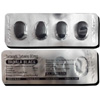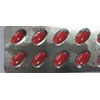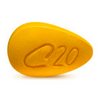INDICATIONS
Doxycycline is used for treating infections caused by certain bacteria. It may be used in combination with other medicines to treat certain amoeba infections. It may also be used to prevent or slow the progression of anthrax after exposure. Doxycycline is a tetracycline antibiotic. It works by slowing the growth of bacteria. Slowing bacteria's growth allows the body's immune system to destroy the bacteria.
INSTRUCTIONS
Take Doxycycline exactly as it was prescribed for you.
- Do not take the medication in larger amounts, or take it for longer than recommended by your doctor. Follow the directions on your prescription label.
- Take Doxycycline with a full glass of water (8 ounces).
- Do not take the medication with milk or other dairy products, unless your doctor has told you to. Dairy products can make it harder for your body to absorb the medicine.
- Do not crush, break, or open a capsule. Swallow the pill whole. It is specially made to release medicine slowly in the body. Breaking or opening the pill would cause too much of the drug to be released at one time.
- Take Doxycycline for the entire length of time prescribed by your doctor. Your symptoms may get better before the infection is completely treated.
- Doxycycline will not treat a viral infection such as the common cold or flu.
- Do not give this medicine to another person, even if they have the same condition you have.
- If you need to have any type of surgery, tell the surgeon ahead of time that you are taking Doxycycline. You may need to stop using the medicine for a short time.
- Do not take any Doxycycline after the expiration date printed on the label. Using expired Doxycycline can cause damage to your kidneys.
- Do not give Doxycycline to a child younger 8 years. It can cause permanent yellowing or graying of the teeth, and it can affect a child's growth.
- If you miss a dose of Doxycycline, use it as soon as possible. If it is almost time for your next dose, skip the missed dose and go back to your regular dosing schedule. Do not use 2 doses at once.
Ask your health care provider any questions you may have about how to use Doxycycline.
STORAGE
Store Doxycycline at room temperature between 68 and 77 degrees F (20 and 25 degrees C) in a tightly closed container. Brief periods at temperatures of 59 to 86 degrees F (15 to 30 degrees C) are permitted. Store away from heat, moisture, and light. Do not store in the bathroom. Keep Doxycycline out of the reach of children and away from pets.
Do NOT use Doxycycline if:
- you are allergic to any ingredient in Doxycycline, or to similar medicines such as demeclocycline (Declomycin), minocycline (Dynacin, Minocin, Solodyn, Vectrin), or tetracycline (Brodspec, Panmycin, Sumycin, Tetracap)
- you are taking acitretin, isotretinoin, or a penicillin (eg, amoxicillin)
- you have recently received or will be receiving a live oral typhoid vaccine.
Contact your doctor or health care provider right away if any of these apply to you.
Some medical conditions may interact with Doxycycline. Tell your doctor or pharmacist if you have any medical conditions, especially if any of the following apply to you:
- if you are pregnant, planning to become pregnant, or are breast-feeding
- if you are taking any prescription or nonprescription medicine, herbal preparation, or dietary supplement
- if you have allergies to medicines, foods, or other substances
- if you have diarrhea, a stomach or intestinal infection, a history of lupus, or the blood disease porphyria
- if you have liver or kidney disease, you may need a dose adjustment or special tests to safely take Doxycycline.
Some medicines may interact with Doxycycline. Tell your health care provider if you are taking any other medicines, especially any of the following:
- Barbiturates (eg, phenobarbital), carbamazepine, or hydantoins (eg, phenytoin) because they may decrease Doxycycline's effectiveness
- Acitretin or isotretinoin because side effects, such as increased pressure inside the skull (resulting in severe headaches and vision problems) may occur
- Anticoagulants (eg, warfarin), digoxin, methotrexate, or methoxyflurane because the risk of their side effects may be increased by Doxycycline
- Live oral typhoid vaccine, hormonal birth control (eg, birth control pills), or penicillins (eg, amoxicillin) because their effectiveness may be decreased by Doxycycline.
This may not be a complete list of all interactions that may occur. Ask your health care provider if Doxycycline may interact with other medicines that you take. Check with your health care provider before you start, stop, or change the dose of any medicine.
Important safety information:
- Be sure to use Doxycycline for the full course of treatment. If you do not, the medicine may not clear up your infection completely. The bacteria could also become less sensitive to this or other medicines. This could make the infection harder to treat in the future.
- Long-term or repeated use of Doxycycline may cause a second infection. Tell your doctor if signs of a second infection occur. Your medicine may need to be changed to treat this.
- Mild diarrhea is common with antibiotic use. However, a more serious form of diarrhea (pseudomembranous colitis) may rarely occur. This may develop while you use the antibiotic or within several months after you stop using it. Contact your doctor right away if stomach pain or cramps, severe diarrhea, or blood stools occur. Do not treat diarrhea without first checking with your doctor.
- Doxycycline may cause you to become sunburned more easily. Avoid the sun, sunlamps, or tanning booths until you know how you react to Doxycycline. Use a sunscreen or wear protective clothing if you must be outside for more than a short time.
- Tell your doctor or dentist that you take Doxycycline before you receive any medical or dental care, emergency care, or surgery.
- Hormonal birth control (eg, birth control pills) may not work as well while you are using Doxycycline. To prevent pregnancy, use an extra form of birth control (eg, condoms).
- Doxycycline may interfere with certain lab tests. Be sure your doctor and lab personnel know you are using Doxycycline.
- Pregnancy and breast-feeding: Doxycycline has been shown to cause harm to the fetus. If you think you may be pregnant, contact your doctor. You will need to discuss the benefits and risks of using Doxycycline while you are pregnant. Doxycycline is found in breast milk. Do not breastfeed while taking Doxycycline.
All medicines may cause side effects, but many people have no, or minor, side effects.
Check with your doctor if any of these most common side effects persist or become bothersome:
Loss of appetite; nausea; sensitivity to sunlight; vomiting.
Seek medical attention right away if any of these severe side effects occur:
Severe allergic reactions (rash; hives; itching; difficulty breathing; tightness in the chest; swelling of the mouth, face, lips, or tongue; unusual hoarseness); bloody stools; chest pain; dark urine; decreased urination; fever, chills, or sore throat; moderate to severe sunburn; severe diarrhea; severe or persistent headache; stomach pain or cramps; throat irritation; trouble swallowing; unusual bruising or bleeding; unusual joint pain; unusual tiredness; vaginal irritation or discharge; vision changes; yellowing of the skin or eyes.
This is not a complete list of all side effects that may occur. If you have questions about side effects, contact your health care provider.
 Viagra Super ActiveViagra Super Active+ is the fourth version of the sildenafil drug known as Viagra enhanced with most active and reliable herbs that give you a new feeling of unlimited potency, over-whelming desire and incomparable endurance. as low as $1.48
Viagra Super ActiveViagra Super Active+ is the fourth version of the sildenafil drug known as Viagra enhanced with most active and reliable herbs that give you a new feeling of unlimited potency, over-whelming desire and incomparable endurance. as low as $1.48 Tadala BlackTadala black contains tadalafil as an active ingredient which is used in the treatment of erectile dysfunction(ED). as low as $1.36
Tadala BlackTadala black contains tadalafil as an active ingredient which is used in the treatment of erectile dysfunction(ED). as low as $1.36 ViagraViagra is indicated for the treatment of erectile dysfunction in men.as low as $0.36
ViagraViagra is indicated for the treatment of erectile dysfunction in men.as low as $0.36 Extra Super CialisExtra Super Cialis is used in the treatment of Erectile Dysfunction with Premature Ejaculation. Extra Super Cialis 100mg contains Tadalafil 40 mg and Dapoxetine 60 mg.as low as $3.36
Extra Super CialisExtra Super Cialis is used in the treatment of Erectile Dysfunction with Premature Ejaculation. Extra Super Cialis 100mg contains Tadalafil 40 mg and Dapoxetine 60 mg.as low as $3.36 CialisCialis is indicated for the treatment of erectile dysfunction. Cialis works faster than other ED drugs and lasts for an extended period of time.as low as $0.76
CialisCialis is indicated for the treatment of erectile dysfunction. Cialis works faster than other ED drugs and lasts for an extended period of time.as low as $0.76 Brand CialisBrand Cialis is a medication used for treating men's erectile dysfunction (ED) and developed by the pharmaceutical company LILLY. Cialis works faster than other ED drugs and lasts for an extended period of time.as low as $3.61
Brand CialisBrand Cialis is a medication used for treating men's erectile dysfunction (ED) and developed by the pharmaceutical company LILLY. Cialis works faster than other ED drugs and lasts for an extended period of time.as low as $3.61